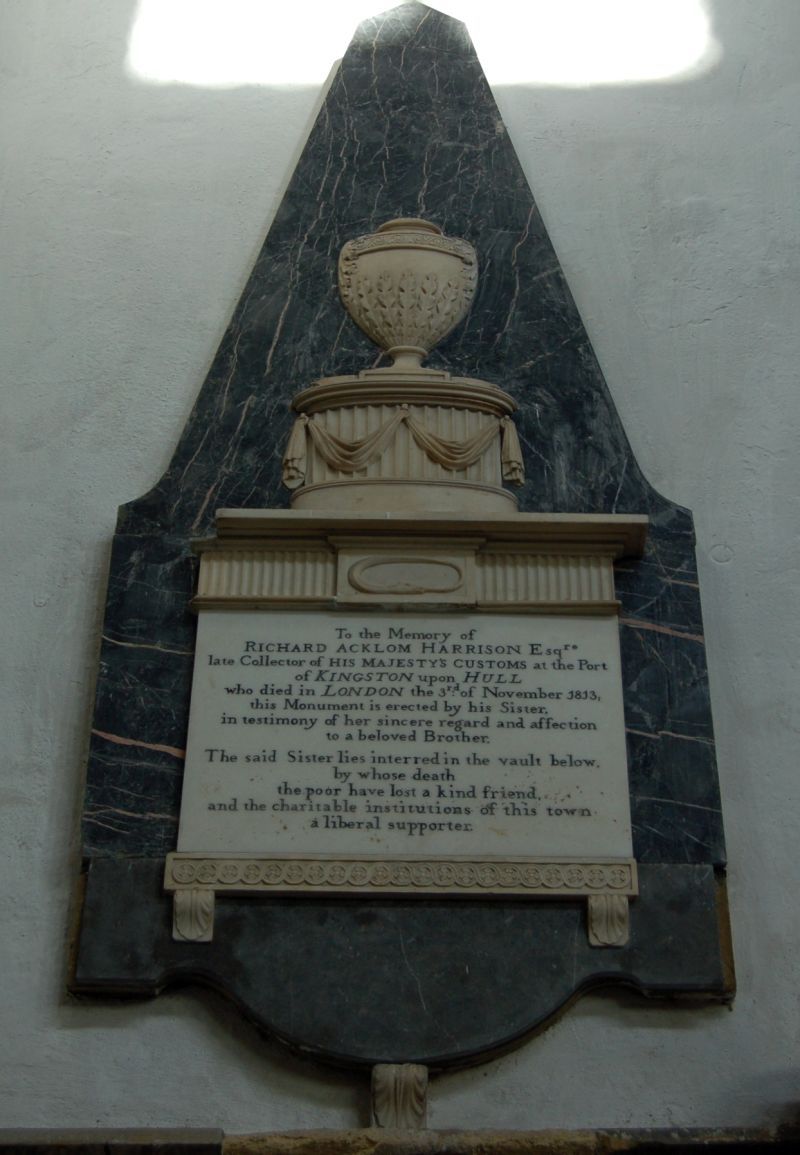The House on Salthouse Lane
In 1801 Richard Acklom Harrison bought a house on Salthouse Lane, Hull. Built in 1780, it was the last large domestic dwelling built within the old city walls. It had been owned by Simon Horner and rented out (the last tenant being Edward Foster Coulson) until Richard bought it. Still lived in, it is a square, 3-storey house sited on 1,050 sq yds of ground. During Richard's ownership the house became no. 13 Salthouse Lane and the street was paved. |
Richard resigned as Collector of Customs in 1805; his successor in the post was Charles Lutwidge (the grandfather of Lewis Carroll). In retirement he seems to have played little part in civic life; the only mention of him in the records is as a subscriber, in 1810-11, to the Kingston upon Hull Subscription Library. On 26 August 1812 he was named as an executor in the will of his relative Richard Acklom of Wiseton. He died in London on 3 November 1813, and was buried in the parish of St Marylebone on 9 November. The burial record gives his "abode" as St Martin in the Fields. He left no will, and all his property passed to his “only next of kin”, his sister Miss Elizabeth Harrison.
Elizabeth was granted letters of administration in the extraordinary sum of £50,000 - an indication of the wealth Richard had accumulated. She continued to live in Salthouse Lane until her death in 1818. Her obituary in the Rockingham newspaper described her as: "a lady whose benevolence to the poor, and cheerful spirit afforded to every charitable object, public or private, will long cause her loss to be regretted."
Elizabeth apparently left money to erect a monument to her brother in Holy Trinity Church. The plaque reads: To the memory of Richard Acklom Harrison Esq. late Collector of His Majesty's Customs at the Port of Kingston upon Hull, who died in London the 3rd of November 1813, this monument is erected by his Sister in testimony of her sincere regard and affection to a beloved Brother. The said Sister lies interred in the vault below, by whose death the poor have lost a kind friend, and the charitable institutions of this town a liberal supporter. The tombstone on the floor below bears the inscription: Beneath this stone are deposited the Remains of Elizabeth Harrison Spinster who died the 10th of November 1818 aged 67 years. |  |
It is surprising, given her experience after her brother's death, that Elizabeth did not leave a will. A prolonged wrangle broke out over her property. The house passed into the possession of George Acklam of Sculcoates and the Rev. Charles Constable of Wassand. Constable was the husband of Lucy Acklom, daughter of Jonathan Acklom of Wiseton, so it appears that the Acklom family were assumed to be her heirs. However, a relative on the Harrison side came forward with a claim. Elizabeth's great-grandfather, Thomas Harrison, had a daughter, Hannah. Hannah's granddaughter Mary had married John Maud of Armin. In 1819 we find Maud selling the properties to William Acklam of Beverley. A trial of ejectment followed in 1820 at the York Lent Assizes to recover possession of the property. But two more claimants had come forward. One was Sarah Pickwell, another granddaughter of Hannah Harrison.
The other claimant was Frances Mary Thomas, the granddaughter of Peter Harrison, Elizabeth's uncle. A case was heard at the York Summer Assizes in 1822, at which William Acklam was judged to be the rightful owner. It must have seemed that the northern courts were bound to be on the Acklams' side. In the Autumn of that year, the Prerogative Court of Canterbury heard Frances' claim; but the onus was on her to prove her descent from Peter, while Maud and Pickwell asserted that he had never married. No documentary evidence was brought forward and the court was disinclined to believe an American's claim. It dismissed Frances' case, citing lack of evidence, and the property was securely in Acklam's hands. (Frances' son Ludlow Thomas became a New York banker.) William Acklam was a Lieutenant in the East Yorkshire Regiment of Militia, and he owned other property in Hull; but it has not been possible to trace his connection to the Acklom family. So ended the story of two generations of a family which lived through extraordinary times. |